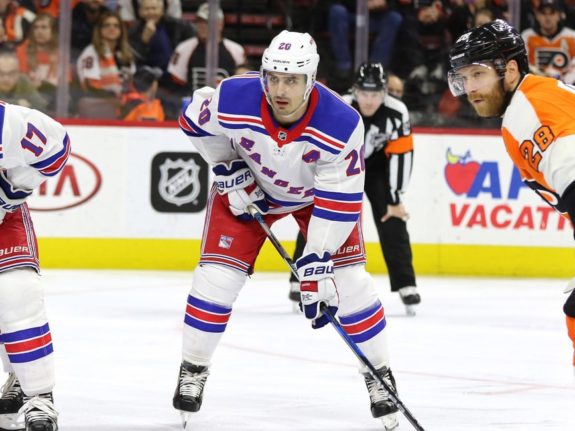After Chris Kreider suffered an upper-body injury against the Detroit Red Wings on Saturday, the New York Rangers were given a chance to see how they would fare without him in the lineup.
So far, the results have not been good.
The Blueshirts held on for a 1-0 win against Detroit, thanks to a goal off a Kreider assist before his injury, but lost 5-3 to the Dallas Stars Monday night. In both games, the team struggled to find a replacement for Kreider on a line alongside Mika Zibanejad and Pavel Buchnevich. Filip Chytil, Kaapo Kakko and Phillip Di Giuseppe all had opportunities to play on the line but none had much success.
Physical Element
Kreider is one of the strongest players in the league. Without him, Zibanejad’s line struggled to forecheck successfully, as Kreider’s replacements were often outmuscled for loose pucks. He has 92 hits in 50 games this season and has often forced opposing defensemen into making mistakes. Replacements Kakko and Chytil rely on skill and lack physicality. Combined, they have just 24 hits this season.

Kreider is also a presence in front of the net. He screens goalies effectively because opposing defensemen are rarely able to move him. This has helped the Rangers score on shots from the point. He has 33 tip-in goals since over the last five seasons, the most in the NHL over that span. He has been especially good at scoring on deflections on the power play. He has also been excellent at screening goalies on the power play, even when he isn’t credited with goals, so statistics don’t do justice to his importance for the team.
The Rangers’ power-play unit stepped up without Kreider, scoring three goals against Dallas, including a tip-in by Brendan Lemieux. Still, it’s tough to imagine the power play will continue to have so much success if Kreider misses a significant amount of time.
Speed
In addition to strength, Kreider is one of the fastest skaters in the NHL. The Rangers have talented playmakers on their blueline and they have repeatedly used stretch passes to give him opportunities to get around opposing defenders. He has scored on a few of these plays and the threat of his speed often creates more space for his linemates.

The Rangers have yet to score an even-strength goal since Kreider’s injury. The fourth line has produced hardly any offense all season and the third line hasn’t been much better. The Blueshirts got almost all of their even-strength scoring from their top two lines, one with Kreider and Zibanejad, the other with Artemi Panarin. Both units excelled. With Kreider out, Zibanejad’s line has failed to play at that same level, which allows opposing teams to use their top defense pair against Panarin’s line. Neither line has been able to create offense without Kreider.
Leadership
Kreider also serves as an alternate captain for the Blueshirts. He is known for his intense work ethic and training. Young players, including Chytil and Brett Howden, are looking to follow his example, and use rigorous training to improve their play.
On the ice, Kreider’s physicality and gritty play also helps give the team energy and momentum. The Rangers missed that in their game against Dallas, as they struggled to get momentum and the few times they did have it, couldn’t keep it for long. For long stretches, they looked lethargic and repeatedly lost battles for loose pucks.
Going Forward
There have been rumors about the Rangers trading Kreider since the offseason and with the trade deadline less than three weeks away, there is a good chance he will be moved. His rare combination of speed and power has led to interest from lots of teams looking to make a playoff run.

The last five periods have given the Rangers’ management a preview of what the team will look like without him. The team’s poor play without Kreider shows that he is an integral member of the Blueshirts. Perhaps it will lead them to re-sign him. However, if they do trade him, his play and leadership will be sorely missed.
Get the latest New York Rangers news, rumors, commentary and analysis